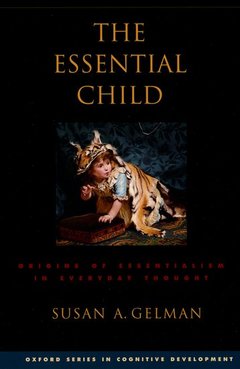Description
The Essential Child
Origins of Essentialism in Everyday Thought
Oxford Series in Cognitive Development Series
Author: Gelman Susan A.
Language: English
Subject for The Essential Child:
The essential child origins of essentialism in everyday thought
Publication date: 05-2005
392 p. · 23.4x15.5 cm · Paperback
Publication date: 05-2005
392 p. · 23.4x15.5 cm · Paperback
The essential child origins of essentialism in everyday thought
Publication date: 05-2003
392 p. · 24x16.8 cm · Hardback
Publication date: 05-2003
392 p. · 24x16.8 cm · Hardback
Description
/li>Contents
/li>Biography
/li>
Numerous fields stake claims about essentialism but this is the first book to address the issues surrounding essentialism from the perspective of developmental psychology. Gelman synthesizes 15 years of empirical research on essentialism into a coherent framework, examining children's thinking and ways in which language influences thought. She argues that young children's use of concepts such as "dog," "man," or "intelligence," reflects their deep commitment to the presence of these categories' properties that extends beyond the observable information about objects. The presence of this commitment in children also means that they do not come into the world as passive recipients of data, but rather have an organizational scheme that supports categories. This volume will be of interest to developmental, cognitive, and social psychologists, as well as to scholars in cognitive science and philosophy.
1: Introduction, Part. Part 1: The Phenomena. Notes on Research Methods, 2: Inductive Potential, 3: Hidden, Non-Obvious Properties, 4: Conceptions of Nature versus Nurture, 5: Causal Explanations, Causal Determinism, 6: Conclusions to Part I, Part. Part 2: Mechanisms of Acquisition. 7: What Parents Say - and Don't Say - about Essences, 8: Essentialism in Language, 9: Theory Theories and DAM Theories, Part. Part 3: Implications and Speculations. 10: Unfinished Business, 11: Why Do We Essentialize?
Susan A. Gelman is the Frederick G. L. Huetwell Professor of Psychology at the University of Michigan. She has authored more than one hundred publications on language and cognitive development and has received numerous honors and awards, including a J.S. Guggenheim Fellowship, a Distinguished Scientific Award from the American Psychological Association for Early Career Contribution to Psychology, and a Boyd McCandless Young Scientist Award from Division 7 of the American Psychological Association. She also serves on the editorial board of several journals. Her research has been funded by the National Institutes of Child Health and Human Development, the National Science Foundation, and the Spencer Foundation.
© 2024 LAVOISIER S.A.S.

